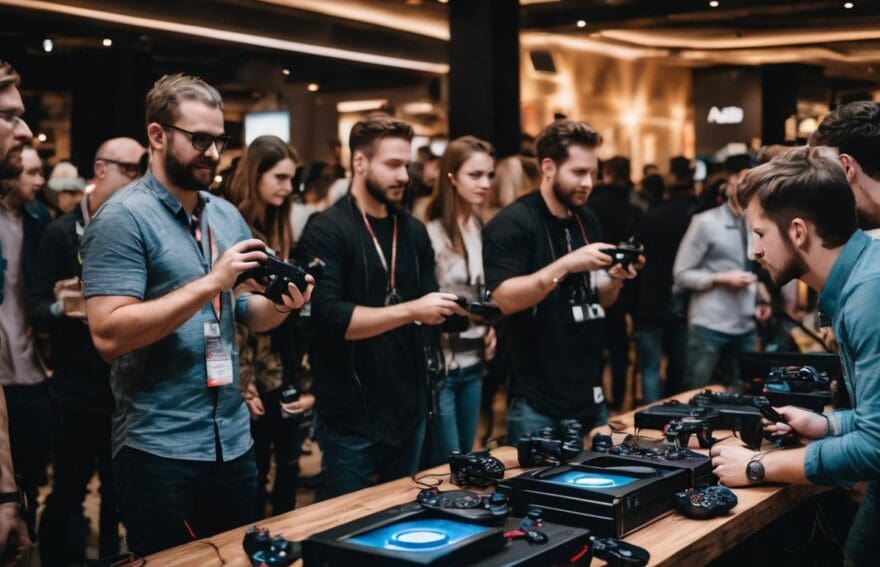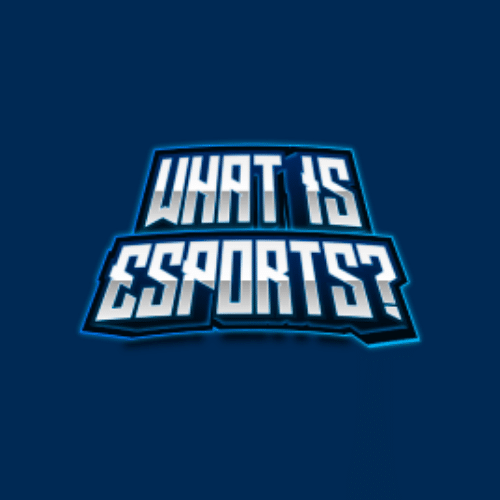FGC Tournaments: What It Takes to Organise a Competitive Event

Updated On: November 29, 2025 by 
Putting together an FGC tournament is no small feat – it’s a bit like trying to execute the perfect combo under pressure. We understand all too well the intricate dance of event planning and navigating throngs of eager participants.
Drawing upon our own trials and triumphs, this article offers a treasure trove of insights, ensuring your gaming gala runs as smoothly as a well-timed finisher. So, buckle in – we’re about to embark on an adventure that will arm you with all you need for a rip-roaring success!
Different Types of FGC Tournaments for Aspiring TOs
Aspiring tournament organisers have a variety of options to choose from when it comes to the format of their FGC tournaments. Whether it’s double elimination, single elimination, “fight card” events, round robin, team tournaments or Swiss style competitions – there’s something for everyone in the fighting game community.
Double Elimination
In double elimination tournaments, we give players a second chance to prove themselves. This bracket style is popular in FGC events because it allows competitors to lose once without being knocked out of the competition.
Every participant starts in the winner’s bracket, but with their first loss, they’re not out; instead, they drop into the loser’s bracket. Here they must fight even harder for a shot at the title.
We love this format as it keeps the excitement alive and ensures that a single mistake doesn’t spell the end for our fighters. It also adds more matches which means more thrilling gameplay for us all to enjoy.
Plus, managing this kind of tournament tests our mettle as organisers – from calling matches to updating brackets – and teaches us how vital resilience is both in-game and behind the scenes.
Single Elimination
Single elimination tournaments are a classic format in the world of competitive gaming. In this format, players compete head-to-head in matches and once they lose, they are eliminated from the tournament.
The winner progresses to the next round until only one champion remains. This type of tournament is known for its simplicity and speed, making it a popular choice for smaller events or when time is limited.
Tournament organisers often use single elimination when hosting events with time constraints as it ensures quick progression through the bracket. It creates an intense atmosphere where every match counts and adds an element of unpredictability to the competition, keeping both players and spectators on edge throughout the event.
“Fight Card” Events
Fight card events in the FGC scene offer an exciting format for both players and viewers, showcasing diverse matchups and rapid-fire action. With a rotating lineup of competitors facing off in quick succession, these events keep the adrenaline pumping throughout the tournament.
Each match becomes a highlight as different playstyles clash, making for an entertaining and dynamic experience. This type of tournament also encourages audience engagement, as they can anticipate and react to each matchup in real-time, creating an electric atmosphere.
The structure of fight card events allows for a variety of matchups that may not typically occur in other tournament formats, providing a platform for lesser-known players to make their mark.
By featuring multiple matches back-to-back, this format offers greater visibility to different skill levels within the community and fosters inclusivity by showcasing the talent across all tiers.
Round Robin
A Round Robin tournament format involves each participant playing against every other participant. This type of event is popular in the FGC community because it ensures that every player has the opportunity to compete with others, making it fair and inclusive.
In a Round Robin tournament, all matches are typically played in a best-of-three format, adding an extra layer of competition and excitement for both players and spectators.
In a Round Robin format, players can gain valuable experience by competing against multiple opponents. Additionally, this type of tournament allows for more matchups to be played out compared to other formats.
Team Tournament
In a team tournament, players form teams and compete against other teams rather than individual opponents. This format allows for collaboration and strategy among teammates. Team tournaments often involve coordinating schedules and strategies with multiple players, adding an extra layer of complexity to the competition.
Organising a successful team tournament requires clear communication and coordination among team members, as well as careful planning to ensure a smooth gaming experience for all participants.
Team tournaments in the FGC community foster camaraderie and teamwork while providing a unique competitive environment for players to showcase their skills. Aspiring TOs should consider the logistics involved in managing multiple teams, ensuring fair play, and creating an engaging experience that highlights both individual talent and collective effort.
Swiss
Swiss tournaments are a format where participants play in every round, irrespective of their win or loss. Each player competes for a set number of rounds, normally determined by the total number of participants.
Opponents are matched based on similar performance throughout the tournament, creating a fair and balanced competition. As an aspiring TO, hosting a Swiss tournament promotes inclusivity and provides ample opportunities for players to showcase their skills regardless of previous wins or losses.
Implementing Swiss tournaments allows all competitors to experience the event fully and gain valuable playing time. The focus is on consistency rather than elimination, making it an ideal format for fostering camaraderie within the FGC community.
Logistics and Planning
Understanding the game being hosted is crucial for tournament organisers. This includes ensuring proper setups and hardware, hiring top announcers, and maintaining open communication with game developers to ensure a smooth event.
Additionally, partnering with sponsors can help fund the tournament and provide added benefits for participants.
Understanding the game being hosted
Understanding the game being hosted is crucial for planning a successful FGC tournament. Knowledge of the specific game mechanics, rules, and community preferences will help in creating an engaging and fair competition.
Familiarising ourselves with the intricacies of different fighting games allows us to tailor the event format and rules to suit the player base, ensuring a positive experience for everyone involved.
Mastery of each game’s unique attributes also enables us to set up proper equipment and hardware, meeting the technical requirements essential for seamless gameplay. Additionally, understanding diverse gaming communities helps in fostering camaraderie and support among participants.
Hiring top announcers
Understanding the game being hosted is crucial, and hiring top announcers can elevate the tournament experience. Engaging, knowledgeable announcers can create an electric atmosphere and keep audiences and players informed and entertained throughout the event. Here’s what it takes to secure top-notch announcers for your FGC tournament:
- Identify experienced announcers with a passion for FGC games, as they will bring insight and enthusiasm to the event.
- Seek individuals with strong communication skills to effectively convey match details, player backgrounds, and game strategies to the audience.
- Ensure that announcers are familiar with the intricacies of different fighting games within the community, allowing them to provide comprehensive analysis during matches.
- Look for professionals who understand the competitive gaming scene and are adept at engaging spectators while maintaining an unbiased approach in their commentary.
- Consider partnering with renowned gaming personalities or casting duos to add prestige and draw attention to your tournament, enhancing its overall appeal.
Communication with game developers
When communicating with game developers for an FGC tournament, we reach out to ensure that the game is up-to-date and any potential issues are addressed. We liaise with them regarding software requirements, updates, and patches to guarantee a seamless gaming experience for all participants.
By maintaining an open line of communication, we can address gameplay concerns or technical difficulties promptly.
Game developers play a crucial role in the success of FGC tournaments, providing valuable support and insights. Engaging in regular discussions with them helps us stay on top of any upcoming changes or developments within the gaming community.
Ensuring proper setups and hardware
To ensure a successful FGC tournament, it’s essential to ensure proper setups and hardware. Here are the key aspects to consider:
- Adequate Gaming Stations: Ensuring that there are enough gaming stations equipped with the necessary consoles or PCs for the tournament.
- High-Quality Monitors: Providing high-quality monitors with low input lag and minimal display latency to maintain fairness during matches.
- Reliable Controllers: Ensuring that there is an adequate supply of reliable controllers for participants who may not have their own.
- Stable Internet Connection: Verifying a stable internet connection at the venue, crucial for online tournaments and updates at live events.
- Comfortable Seating Arrangements: Providing comfortable seating for players to enhance their focus and performance during matches.
- Clear Audio Systems: Implementing clear audio systems for announcements and game sound effects, enhancing the overall event experience.
- Backup Equipment: Having backup equipment on standby in case of technical issues arising during the tournament.
- Efficient Power Supply: Ensuring adequate power outlets and surge protectors to cater to the power needs of all gaming equipment.
- Accessibility Considerations: Making sure that all setups and hardware are accessible to accommodate any special requirements or disabilities among participants.
Partnering with sponsors
After ensuring proper setups and hardware, the next crucial step is partnering with sponsors. Here’s how you can do it:
- Research potential sponsors who align with the FGC community and its values, such as gaming peripheral companies, energy drink brands, or gaming software developers.
- Craft a compelling sponsorship proposal highlighting the benefits for sponsors, including brand exposure to a passionate and engaged gaming audience.
- Offer various sponsorship tiers with different perks to cater to the budget and marketing goals of potential sponsors.
- Provide sponsor recognition through event branding, logo placement on marketing materials, social media shoutouts, and on-site visibility during the tournament.
- Collaborate with sponsors to enhance the overall tournament experience by offering exclusive promotions, product demonstrations, or giveaways for attendees.
- Follow up with sponsors after the event to express gratitude and discuss the impact of their support while seeking feedback for potential future partnerships.
Event Format and Rules
FGC tournaments often follow a double elimination format, where players must lose twice before being eliminated from the competition. This setup allows for more opportunities to compete and ensures that skill is prioritised over luck.
Additionally, rules typically dictate best-of-three or best-of-five matches in the early stages of the tournament, with longer sets as players progress through the brackets. These rules not only showcase competitors’ adaptability but also provide an engaging experience for spectators.
In terms of specific game rules, FGC tournaments adhere to titles’ respective community-established standards while considering input from developers. For instance, player conduct guidelines and character bans might be put in place to maintain fairness and sportsmanship across various games within the fighting genre.
Moreover, some events incorporate additional regulations such as a timer on character selection or stage choices to ensure efficient gameplay.
Tips for Running a Successful Tournament
We’ll be sharing our top tips for running a successful FGC tournament, from overcommunicating with players and staff to thinking outside the box for unique events. If you want to learn more about what it takes to organise a competitive gaming event, keep reading!
Overcommunication with players and staff
To ensure a smooth and successful FGC tournament, clear and constant communication with players and staff is key. From registration details to event schedules and rule sets, providing thorough information at every stage helps keep everyone on the same page and minimises any potential misunderstandings.
Encouraging open channels of feedback also fosters a collaborative atmosphere, allowing participants to share their concerns or suggestions for improvement.
When organising an FGC tournament, it’s crucial to maintain regular contact with both players and staff. Providing timely updates about match timings, rule clarifications, and any changes in the event schedule helps create a positive experience for everyone involved.
Being prepared for any issues
When organising an FGC tournament, it’s crucial to be prepared for any potential issues that may arise during the event. From technical difficulties with game setups to last-minute changes in the schedule, having contingency plans in place can help ensure a smoother experience for both players and staff.
Being proactive by anticipating and addressing possible challenges can make a significant difference in the overall success of the tournament.
Additionally, considering factors such as internet connectivity, power outages, or equipment malfunctions beforehand allows organisers to troubleshoot effectively and minimise disruptions.
Prioritising the experience for players
Creating a memorable experience for players is paramount for running a successful FGC tournament. Ensuring that the atmosphere is inclusive and welcoming, with fair and well-organised matches, contributes to an enjoyable event.
Providing comfortable seating, adequate lighting, and clear signage enhances the overall experience for participants. Offering engaging post-event activities can also foster a sense of community among attendees.
Moreover, implementing measures to address player feedback and concerns demonstrates a commitment to improving future tournaments. Acknowledging top gamers who promote events not only incentivises them but also adds value to the gaming community as a whole.
Keeping a balance in spending
When organising a fighting game tournament, it’s crucial to keep a balance in spending. This means carefully allocating funds for essential aspects such as venue rental, equipment, and prizes while avoiding unnecessary expenses.
By prioritising the allocation of resources, organisers can create an engaging and enjoyable event without overspending.
Balancing spending also involves seeking cost-effective solutions without compromising the quality of the tournament. This could involve negotiating discounts with vendors or seeking sponsorship for specific aspects of the event.
Thinking outside the box for unique events
When it comes to thinking outside the box for unique events, creativity is key. By incorporating unconventional formats or adding themed elements, organisers can create a memorable experience for players and attendees.
For instance, hosting a retro-themed FGC tournament can attract older gamers who have a nostalgic love for classic fighting games. Incorporating side tournaments or mini-games alongside the main event can add variety and excitement to the overall experience.
Additionally, implementing non-traditional prize structures such as custom artwork commissions or exclusive in-game items can further enhance the appeal of the event.
Furthermore, embracing new technology like virtual reality setups or integrating live streaming components into the event can introduce fresh dynamics that set the tournament apart from others.
Conclusion
In conclusion, hosting a successful FGC tournament is a challenging yet rewarding endeavour. Understanding the specific game being hosted and ensuring proper setups are essential for a seamless event.
Overcommunicating with players and staff, as well as prioritising the overall experience, are key factors in running a successful tournament. Thinking outside the box for unique events can set your tournament apart and attract more participants.
Keeping a balance in spending and being prepared for any issues that may arise will contribute to the overall success of the event.
FAQs
1. What are the basics of organising an FGC tournament?
Organising an FGC tournament involves planning and executing a video gaming competition, handling event management, and ensuring everything runs smoothly from start to end.
2. How do you set up a competitive bracket for an eSports tournament?
To set up a competitive bracket in an eSports tournament, you can use formats like the double elimination bracket to fairly determine top gamers through multiple rounds of play.
3. What should aspiring tournament organisers know about hosting gaming events?
Aspiring tournament organisers should learn the dos and don’ts of hosting gaming events to manage local competitions successfully while providing incentives for promoting these events among players.
4. Can anyone organise their own local FGC competition?
Yes, with careful event planning, coordination skills, and knowledge in managing logistics, anyone passionate about video gaming can run their own local FGC competition.
5. What is involved in post-event activities for Esports tournaments?
Post-event activities include the administration work such as sharing results, thanking participants and sponsors, analysing the success of the event and considering improvements for future tournaments.


